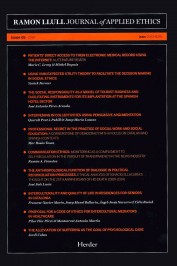THE ANTHROPOLOGICAL FUNCTION OF DIALOGUE IN POLITICAL RECONCILIATION PROCESSES. ETHICAL ANALYSIS OF IGNACIO ELLACURÍA’S THOUGHT ON THE 25TH ANNIVERSARY OF HIS DEATH (1989-2014)
Article Sidebar

Main Article Content
José Sols Lucia
IQS, Ramon Llull University
The idea of a just and lasting peace seems to be unachievable when people are suffering a civil or international war, a violent revolutionary process or a dictatorship, or when they are immersed in a long period of structural injustice. However, during the last decades there have been a number of attempted transitions from violent situations to a just peace through peace-making processes and talks, followed by reconciliation, some of which have been remarkably successful, whilst others are still open (e.g. El Salvador, South Africa, Northern Ireland, the Israel-Palestine conflict, among others). These processes, and their extremely technical complexity, are the object of analysis in the Political Science discipline; yet should they not also be the object of study in other disciplines such as Anthropology and Ethics? Opposing issues such as the possibility of self-aggression yet of radical transformation, the restoration of dialogue, the recognition of others as being equal, and the achievement of a just peace for all are at the centre of being human. In this regard, the work of Ignacio Ellacuría in the context of the civil war in El Salvador (1981-1991) is extremely interesting. This paper presents an analysis of his theoretical contribution structured as follows: the analysis of the concepts of dialogue, social dialogue and political dialogue; the context of violence in which he constructs his ethical and anthropological thought; his defence that social dialogue involves the affirmation of the possibility of moral transformation as an anthropological feature of human beings; the possibility to contest any of the multiple objections to dialogue with reason; his view that the reconciliation process goes from ideological monism to dualism, and from there to a wider and more well-defined pluralism; his conviction that political dialogue makes sense as the fulfilment of social dialogue so it can never replace the latter without losing legitimacy; his definition of the mediator as a key figure, essential to overcoming ideological dichotomy; his objective of achieving a just and lasting peace.
The Jesuit Ignacio Ellacuría was a theologian and a philosopher, a sharp political analyst, and a mediator in the Salvadorean conflict, where 75,000 human lives were lost in 10 years. He applied the “Philosophy of Reality” of his maestro Xavier Zubiri to the postcolonial and revolutionary reality of Central America from the 1960s to the 1980s. He was killed by the army in 1989. The 25th anniversary of his death (1989-2014) is an appropriate moment to undertake an anthropological and ethical analysis of his contribution to political and social peace processes.
The Jesuit Ignacio Ellacuría was a theologian and a philosopher, a sharp political analyst, and a mediator in the Salvadorean conflict, where 75,000 human lives were lost in 10 years. He applied the “Philosophy of Reality” of his maestro Xavier Zubiri to the postcolonial and revolutionary reality of Central America from the 1960s to the 1980s. He was killed by the army in 1989. The 25th anniversary of his death (1989-2014) is an appropriate moment to undertake an anthropological and ethical analysis of his contribution to political and social peace processes.
Paraules clau
gnacio Ellacuría, Violence, Social dialogue, Political dialogue, Plurality, Peace talks, Just peace, Political renconciliation, El Salvador
Article Details
Com citar
Sols Lucia, José. “THE ANTHROPOLOGICAL FUNCTION OF DIALOGUE IN POLITICAL RECONCILIATION PROCESSES. ETHICAL ANALYSIS OF IGNACIO ELLACURÍA’S THOUGHT ON THE 25TH ANNIVERSARY OF HIS DEATH (1989-2014)”. Ramon Llull Journal of Applied Ethics, vol.VOL 1, no. 5, pp. 125-41, https://raco.cat/index.php/rljae/article/view/283954.
Biografia de l'autor/a
José Sols Lucia, IQS, Ramon Llull University
Director of the Chair of Ethics and Christian Thought at IQS (Institut Químic de Sarrià) of Ramon Llull University and coordinator of the international research group LACS (Laboratory of Analysis and Social Criticism).Articles més llegits del mateix autor/a
- José Sols Lucia, Review of Ética de las finanzas, by Carmen Ansotegui, Fernando Gómez-Bezares, Raúl González Fabre (Desclée de Brouwer, 2014) , Ramon Llull Journal of Applied Ethics: Núm. 7 (2016): Issue 7